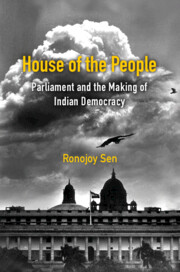Book contents
- Frontmatter
- Dedication
- Contents
- List of Illustrations
- Acknowledgements
- Introduction
- 1 The Road to Parliamentary Democracy: The Constituent Assembly and Its Prehistory
- 2 Protean Institution: The Changing Composition of Parliament
- 3 ‘Please Take Your Seat!’ Disruptions in Parliament
- 4 Inside Out: The Parliamentary Committee System
- 5 Corruption, Criminality and Immunity
- Conclusion
- Index
3 - ‘Please Take Your Seat!’ Disruptions in Parliament
Published online by Cambridge University Press: 11 October 2022
- Frontmatter
- Dedication
- Contents
- List of Illustrations
- Acknowledgements
- Introduction
- 1 The Road to Parliamentary Democracy: The Constituent Assembly and Its Prehistory
- 2 Protean Institution: The Changing Composition of Parliament
- 3 ‘Please Take Your Seat!’ Disruptions in Parliament
- 4 Inside Out: The Parliamentary Committee System
- 5 Corruption, Criminality and Immunity
- Conclusion
- Index
Summary
Legislators are increasingly unwilling to play the parliamentary game or to accept the possibilities this form of regulated conflict provides…. Legislators who cannot use their tongues fling shoes.
– Lloyd Rudolph and Susanne Rudolph, In Pursuit of LakshmiAs more and more participants came to see the game as their own, they brought their own expectations, demands, and beliefs. At least some of the sections hitherto excluded from centres of power thought it was time they had a say in framing the rules of the game.
– Yogendra Yadav, Making Sense of Indian DemocracyIt was the budget session of 2011 and I had planned to watch most of the first half of the session from the viewing gallery. On 4 March, like most days, the proceedings were to begin with the Question Hour followed by papers and reports to be laid on the table of the House. The second half was to be devoted to debating the annual railway budget, which had been presented in parliament earlier. Almost as soon as the day's proceedings began at 11 a.m., protests began over the issue of carving out the state of Telangana from the southern Indian state of Andhra Pradesh. From the gallery all that could be seen was the rush of slogan-shouting protesters towards the well of the House.
The happenings that day were not unusual. The most significant feature of parliament in recent years is the rise in disruptions and protests and the concomitant drop in productivity. The Speaker's plaintive words, ‘Please take your seat,’ have become the most commonly heard refrain in the Lok Sabha over the last two decades or so. The statistics tell a grim story. The number of days that the Lok Sabha sat had come down from an average of 127 per year in the 1950s to 73 in 2011, the year the Indian parliament turned sixty (Figure 3.1). In the same period, the annual average number of bills passed by parliament had come down from seventy-two to forty. In the subsequent years, there have been marginal changes in the number of sittings.
These figures can partly be explained by the amount of time lost due to disruptions, which had steadily risen from 5 per cent of working time in the truncated eleventh Lok Sabha (1996–97) to 39 per cent in the fifteenth Lok Sabha (2009–14) (Figure 3.2).
- Type
- Chapter
- Information
- House of the PeopleParliament and the Making of Indian Democracy, pp. 128 - 178Publisher: Cambridge University PressPrint publication year: 2023



